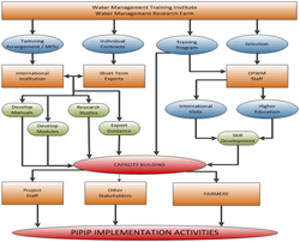Recent Accomplishments
Under Punjab Irrigated-Agriculture Productivity Improvement Project (PIPIP), WMTI is responsible for component C1 (“Adoption and Promotion of Modern Irrigation Technologies and practices”) & D3 (“Strategic Studies, Technical Assistance and Training etc.”) under the PIPIP project other than its routine work. Following methodology for component C-1 and D-3 has been established under PIPIP.
Methodology for Components C1 & D3
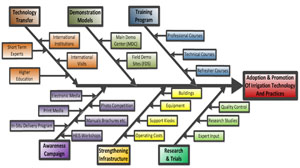
Improved Agricultural Technology and Practices
The PIPIP intends to make use of international experience through a comprehensive program of exchange of experts and skill development of trainers and key personnel through an information sharing program aimed at achieving an advanced level of technical expertise.
Technology Transfer
This sub-component involves: collaboration with international institutions; short term experts (Technical Assistance and Training Consultants); international visits, and specialized foreign training. Methodology for this sub-component is as follows:
Awareness Campaign
Widespread publicity is vital to generate awareness and participation of HEIS technologies. Past efforts have mostly been in-house using basic publicity materials such as brochure and pamphlets. A more systematic and professional approach is required to get across the message of the project objectives. The various methods of the awareness campaign will include: Development of media clips; Media Campaign (Radio/TV); Cable operators to run tickers in rural areas; Advertisement through press; In-situ Information Delivery Program; HEIS equipment seminar/workshop by SSCs; Printing of WMTI Manuals, Pamphlets, brochures, leaflets; and Organizing photographic competition to highlight water importance. Methodology for this sub-component is as under:
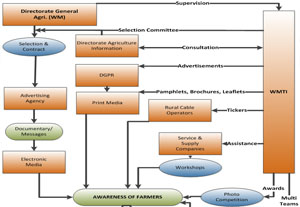
Demonstration and Training ModelsAn effective technique for high impact awareness and responsiveness is the use of demonstration and training models. The Water Management Training Institute will carry out two different types of demonstration activities. The main central demonstration farm will be established at the Water Management Research Farm, and satellite demonstration centers will be established at 100 sites throughout the province. The main demonstration site at WMRF will also serve as field training farm as well as venue for conducting research trials. |
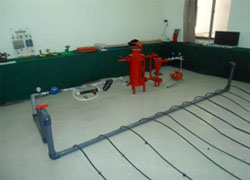 |
Development of Infrastructure
The major field demonstration, training and research activities under PIPIP will be carried out at the 75 acres Water Management Research Farm. Land for the WMRF was allocated during 2010-11, and construction work on a limited number of buildings was initiated in November 2011 under the scheme “Up-gradation of WMTI”. The present infrastructure is quite inadequate to meet the multiple requirements of the PIPIP capacity building and awareness components.
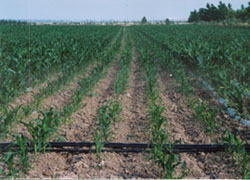 |
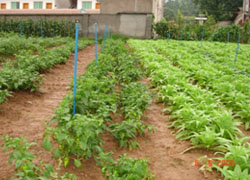 |
|
| Field Demonstrations | ||
The revival of discontinued water management research activities since 1981 has now been prioritized under Up-gradation of WMTI project. The Water Management Research Farm comprising of 75 acres land at Renala Khurd, serves dual purpose as a research facility as well as training demonstration and field activity site. The farm will include complete demonstration of wide range of water management technologies. This sub- component will also give emphasis on Strengthening of WMRF and Establishment of Farmers Information and Service Desk/Kiosks.
Training and Research Plan
Capacity building of all stakeholders involved in the PIPIP is the crux of the WMTI activities. The training activities of the WMTI are generally sub-divided in three categories i.e., Professional Courses, Technical Courses, and Refresher Courses. It has been planned that, 118, 237, and 147 trainings of professional, technical and refreshers courses respectively will be provided at WMTI. Apart from the training programs for staff and farmers, the project also intends to provide exposure to people from various walks of society to learn and observe HEIS technologies and practices under developing skill knowledge.
Research
The PIPIP capacity building efforts also include a component for research in various areas related to HEIS. Research activities will be carried out in collaboration with the expert consultants and scientists from institutions such as PARC, Islamabad; WM RC, University of Agriculture, Faisalabad; Arid Agricultural University, Rawalpindi; Alternate Energy Development Board; Ayub Agricultural Research Institute, Faisalabad; International Water Management Institute, Lahore; Pakistan Council for Renewable Energy Technology, Islamabad etc. at the WMRF, Renala Khurd.

